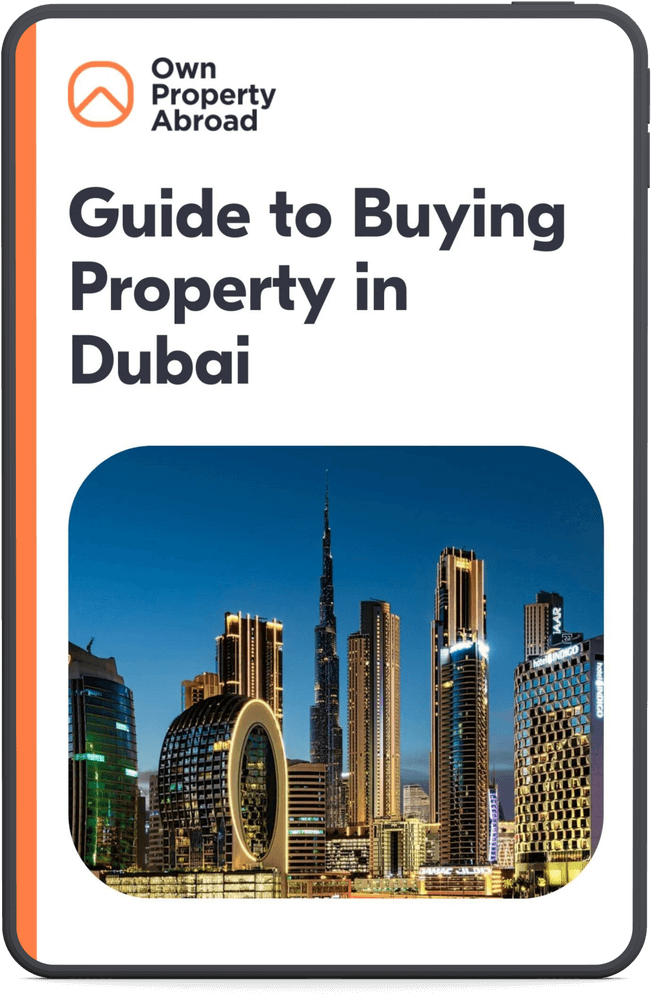Can foreigners buy property in Dubai?
Foreigners can buy property in Dubai, as the United Arab Emirates (UAE) offers a freehold property system. This system allows foreigners to buy freehold property. It also enables foreigners to sell or lease property for up to 99 years. There are several restrictions, although these are minimal. For example, specific areas are designated as freehold zones where foreigners can own a house or apartment. You can read more about these zones further in this article.
Valuable insights and practical advice, distilled from years of expertise and real-world experience.


Legalities and paperwork
It’s essential to understand the legal framework of the United Arab Emirates before buying property in Dubai. Specific laws and regulations regulate real estate in Dubai to ensure transparency and security for buyers and sellers. These are the essential documents to buy property in Dubai:
- Passport
- Current residence visa for UAE
- Title deed (proves ownership)
- No Objection Certificate (NOC)
- Power of Attorney if the buyer uses a real estate agent or representative to perform the transaction
Working with a real estate agent in Dubai is advisable, but work with a registered real estate agent. They can verify all paperwork to avoid potential legal issues with your property purchase.
Buy property in Dubai in 6 steps
Foreigners can buy a house in Dubai by following the following six steps.
Step 1: Research the Dubai property market
It’s essential to have an understanding of the various options you have when delving into the Dubai property market. Take some time to reflect on whether you want a house in Dubai or an apartment in Dubai. By conducting thorough research and comparing the alternatives, you can make an informed choice that guarantees a fulfilling investment in the future.
Step 2: Choose a real estate agent
Dubai’s property market and regulations are different from other countries. That’s why working with a real estate agent who understands property laws, regulations, and rules is smart. Ensure that the real estate agent you work with is registered with the Dubai Land Department.
Step 3: Find a property in Dubai
Visit multiple properties and choose one that fits your requirements and budget. There are several ways to find a property in Dubai, such as using Dubai property websites, working with a local real estate agent, or searching for online advertisements.
Step 4: Preliminary agreement and deposit
Once you’ve decided to buy the property, a Memorandum of Understanding (MOU) is signed, which can be seen as a preliminary agreement. A deposit (usually 10%) is paid to secure the property.
Step 5: Obtain NOC
The buyer and seller must meet at the developer’s offices to apply for the No Objection Certificate needed to sell the property. The developer mostly charges a fee to issue the NON.
Step 6: Finalize the property sale
After obtaining the NOC, the parties involved may proceed to the Dubai Land Department office for the official transfer of ownership. The department requires payment of the purchase price in the form of a manager’s cheque payable to the seller on the transfer date. Once completed, the buyer receives a new title deed in their name.
Where to buy property in Dubai?
Citizens of the United Arab Emirates (UAE) or Gulf Cooperation Council (GCC), such as Saudi Arabia, Oman, Bahrain, Kuwait, and Qatar, can buy property in Dubai wherever they want.
All foreigners from other countries are restricted to certain areas where they can buy freehold property in Dubai. These areas include:
- The Palm Jumeirah
- The World Islands
- Downtown Dubai
- Old Town
- Burj Khalifa
- Business Bay
- Dubai Marina
- Emirates Hills
- Jumeirah Lakes Towers (JLT)
- Jumeirah Beach Residence (JBR)
- Discovery Gardens
- Arabian Ranches
- Midriff (specified plots)
- Dubai Investment Park (DIP)
- Falcon City
- Dubai Sports City
- Dubai Motor City
- Dubai South
- International City
- Jumeirah Islands & Jumeirah Village
Most foreigners buy property in Palm Jumeirah, CityWalk Dubai, Jumeirah Beach Residence, Dubai Marina, Arabian Ranches, and Dubai Downtown.

Property taxes and fees in Dubai
Favorable tax conditions exist in Dubai, which attracts many foreign investors. There is no income, rental, or inheritance tax for property in Dubai. Foreigners only pay the Dubai Land Department a 4% transfer fee when transferring property ownership. However, this tax amount is usually split between the buyer and the seller. Property owners in Dubai don’t pay annual property taxes.
- Registration fee:
- AED 2,000 ($545) if the transaction value is less than AED 500,000 ($136,150) and;
- AED 4,000 ($1,089) if the transaction value is more than AED 500,000 ($136,150).
- Administration fee for the tax payment: AED 250 ($68.08)
- Administration fee for issuing the ownership certificate: AED 250 ($68.08)
Residency visa when buying property in Dubai
Foreigners who buy a house or apartment in Dubai can obtain a residency permit for the United Arab Emirates. The type of visa someone is eligible for depends on the investment amount. There is a Golden Visa and an Investor Residence Visa:
- 2-year Investor Residence Visa: Invest at least AED 750,000 ($204,225) in real estate.
- 10-year Golden Visa: Invest at least AED 2 million ($544,600) in real estate.
Benefits of investing in Dubai real estate
Investing in a house or an apartment in Dubai offers numerous benefits:
- High ROI: Dubai’s real estate market provides attractive rental yields, ranging between 5-9%.
- Property visa: Property owners can get a residence visa valid for up to ten years, based on the amount someone invests in Dubai real estate.
- World-class amenities: Properties come with modern amenities and facilities.
- Security: Dubai is one of the safest cities globally, with a low crime rate.
- Favorable tax conditions: Dubai doesn’t have property taxes and stamp duties, which can make investing in Dubai real estate financially beneficial.
Buy property in Dubai with Own Property Abroad
Thinking about buying property in Dubai? Our comprehensive ebook is designed to guide you through every step, from understanding legal requirements and finding the right property to negotiating deals and conducting due diligence. With the right knowledge, you can make your property purchase in Dubai smooth, secure, and hassle-free. Want personalized support? Leave your details below, or email us directly at [email protected].
Valuable insights and practical advice, distilled from years of expertise and real-world experience.


Frequently Asked Questions (FAQs)
Can foreigners buy property in Dubai?
Foreigners can buy property in designated freehold areas in Dubai. It’s also possible to lease a property (up to 99 years) or sell property in Dubai as a foreigner.
What is the difference between freehold and leasehold?
Freehold allows full ownership over the property, while leasehold offers rights for a specified period. In the case of Dubai, the leasehold agreement can be valid for a maximum of 99 years.
Is it safe to invest in real estate in Dubai?
It’s safe to invest in real estate in Dubai, as Dubai’s real estate market is regulated by the government, ensuring safety and transparency for investors.




2 Responses
What is the process of obtaining a mortgage as a foreigner who has UAE residency through investment (freehold company) but wishes to buy property through mortgage as a non-resident the buyer is currently working in another GCC country.
To obtain a mortgage as a foreigner with UAE residency but wishing to buy property in another GCC country, you need to approach local banks that offer non-resident mortgages. They will evaluate your financial status and residency. Consulting with a mortgage advisor can help clarify specific requirements and processes.